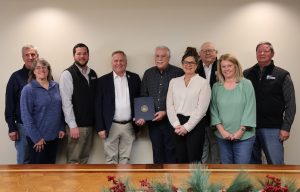Waterloo School Board listens to busing, personnel concerns
By ALAN DOOLEY and COREY SAATHOFF
For the Republic-Times
The Waterloo School Board held multiple meetings last week in the wake of planned changes to its bus policy for next school year and the recent creation of an assistant superintendent for business and operations position.
Public meetings were held Monday and Thursday to explain the district’s new bus policy. Thursday’s meeting at Gardner Elementary became heated at times, with concerned parents expressing displeasure with the policy change.
An estimated 50 parents listened as school superintendent Jim Helton discussed plans to eliminate all bus transportation to and from daycare facilities. Only home-to-school and school-to-home transportation will be provided — and that is limited to students beyond a 1.5-mile distance from school. Cuts in transportation funding and late payments from the state have brought upon this change, Helton stressed.
When the floor was opened to questions, heated emotions erupted from parents. At some points, there were multiple people shouting to get attention. This was finally quelled by an equally impassioned plea for respect for each other.
Some parents said the district’s plans are basically “all about dollars and not about kids.” Safety issues, both generally and specifically, rose from others.
Others criticized the after-school Kennel Klub program offered by the district as “inferior” to daycare programs. Helton countered that virtually everyone who has children in the program is delighted.
“Users want to come back, they tell us,” he said.
The Kennel Klub was created out of last year’s busing changes to help families affected by the initial change. It currently serves students in grades kindergarten through fifth grade. This program will be extended to sixth graders next school year.
Helton explained at the meeting that Waterloo school buses used to pick up and deliver children to daycare facilities on school days. But state funding cuts drove the board to limit this service to daycares beyond 1.5 miles of school this school year, requiring parents to make other arrangements or local daycares to invest in transportation assets.
“We thought we had a workable transportation solution last year when we cut busing to daycares within a 1.5-mile radius,” he said. “But the state demands that if we bus to more distant daycares, we do so to all daycares – licensed, unlicensed, to grandparents, neighbors and babysitters. The daycare location becomes the residence.
“We no longer can afford that, and cuts are required. And, the state is considering pushing that mandatory busing distance from 1.5 to two miles,” Helton continued.
Governor Quinn’s proposed education budget for the coming year calls for more cuts, Helton said. While the state mandates itself to provide 76 percent of the cost of busing students, this year it provides 58 percent and projects a drop to 19 percent next year — all while that and other state money is arriving late anyhow.
Some of those in attendance at the meeting cited personal issues, noting they must work and their schedules don’t allow them to be home when children return at the end of a school day. Another asked if the Kennel Klub could be expanded to holidays and summer months, since the new plan will eliminate transportation to all other child care options.
But to ensure a slot for the summer months, several said they would have to pay year-round.
“This will drive me to welfare,” one shouted.
Waterloo School Board President Dwight Schaefer proposed a plan that garnered wide approval. He asked for a small group of parents to join and formulate a plan that accommodates all or most of their concerns.
“Then, we will all sit down together to call the state board and ask if that plan is feasible,” he said.
Schaefer and Helton emphasized, however, that whatever is decided must be both legally and fiscally feasible.
“The state has and will audit us again,” Helton warned. “They are watching, and if they decide we are in violation, they could cut off all GSA funding. That would be disastrous.”
Ryan Weber, who operates Children First Learning Center on Lakeview Drive along with his wife, said that, currently, about half of the center’s young people are still bused because of designated hazards from a lack of sidewalks and risks of crossing the busy highway. That opportunity would be lost under the district’s new busing policy, he said.
The way ahead is uncertain at best. After the meeting ended, small groups of parents stood together to share ideas. Others spoke with individual board members to ask questions and propose solutions. But, at this point, the very real division between fiscal realities and desires to maintain the status quo are obvious.
Assistant superintendent
During a special meeting last Wednesday, the school board delayed its decision on hiring an assistant superintendent following an hour-long closed session in which an estimated 40 teachers and concerned community members waited outside the board room.
On March 18, the board voted 5-2 in favor of creating this new position to help the district transition during the upcoming retirements of superintendent Helton at the end of the 2013-14 school year and longtime district office manager Laverne Pflueger after that.
Earlier that same night, the board approved a reduction in force of three teachers due to ongoing budget concerns as part of declining and late state funding. As is the case with earlier such reductions, some of those teachers may be hired back as the budget picture becomes clearer.
When the meeting opened to the public last Wednesday, Schaefer addressed those present by saying that while the board feels strongly about bringing in help for the business side of district operations, it plans to do a better job of informing the community of its plans while at the same time soliciting public input going forward.
“We hear you. We’re listening,” he said. “The last thing we want to do is take money out of the classrooms.”
The school board said public forums and focus groups will be planned to further research the matter before any official action is taken.
“You will have chances to ask questions and form opinions,” Schaefer said.






